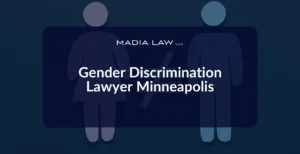
At Madia Law LLC, our Minneapolis gender discrimination lawyers represent employees in serious workplace discrimination claims. We take action fast, gather evidence early, and push employers through aggressive litigation under Minnesota and federal law. We fight unequal pay, harassment, retaliation, and termination rooted in gender bias, and we do it with a trial mindset from day one.
Madia Law LLC handles employee‑side discrimination claims across Minneapolis with a focus on results, not delay. Our attorneys pursue justice through strategic lawsuits, strong negotiation leverage, and courtroom advocacy when needed.
Call our Minneapolis office to begin your discrimination evaluation today.
Madia Law LLC’s Approach to Gender Discrimination Representation
We represent employees across Minneapolis with a trial-first mindset and zero tolerance for discrimination or retaliation. From the moment you contact us, we move quickly to uncover the truth – reviewing emails, internal reports, HR responses, and hidden patterns of misconduct that employers often disguise as “business decisions.”
We don’t wait for companies to “do the right thing.” We build your case like it’s heading to court from day one, locking down evidence, identifying witnesses, and preparing for trial under both the Minnesota Human Rights Act and Title VII. Through strategic discovery, focused negotiation, and powerful courtroom advocacy, we hold employers fully accountable for their actions.
Our goal is simple: to protect your rights, restore your confidence, and deliver results that make change possible for you and for every worker who refuses to be silenced.
For a legal consultation with a sex discrimination lawyer serving Minneapolis, call 612-349-2729
Litigation for Gender and LGBTQ+ Workplace Discrimination in Minnesota
Madia Law litigates workplace discrimination cases based on gender, gender identity, and sexual orientation under both Minnesota law and federal civil rights statutes. Our Minneapolis-based employment attorneys don’t just file claims; we prepare for trial, confront bias with evidence, and force employers to answer for identity-based discrimination.
- Sex-Based Discrimination: Hiring, pay, or promotions that favor men over equally qualified women.
- Gender Identity Bias: Misgendering, denial of restroom access, or exclusion from duties and opportunities.
- Sexual Orientation Discrimination: Retaliation, stalled advancement, or sudden termination linked to identity.
- Hostile Work Environment: Persistent slurs, taunts, or harassment creating unsafe and demeaning conditions.
- Unequal Pay: Women and nonbinary workers earning less than male peers for substantially similar work.
- Glass Ceiling Discrimination: Barriers that keep women or gender minorities from leadership despite proven results.
Our firm pursues these claims aggressively throughout Minnesota, from pre-suit investigation to courtroom verdict.
Minneapolis Sex Discrimination Lawyer Near Me 612-349-2729
Handling Workplace Claims for Pregnancy and Caregiver Bias
Our attorneys represent employees who have faced discrimination tied to pregnancy, parental status, or caregiving responsibilities, enforcing rights under the Minnesota Human Rights Act (MHRA), the Family and Medical Leave Act (FMLA), and all relevant state leave protections.
Common Violations We Litigate
- Denied Accommodations: Employers refusing light duty, modified schedules, or necessary adjustments during pregnancy.
- Demotions After Leave: Retaliating against workers returning from protected family or medical leave.
- Wrongful Termination: Firing caregivers over scheduling conflicts or dependent care needs.
- Reduced Hours or Duties: Punishing employees for balancing work and caregiving responsibilities.
- Leave Interference: Blocking or discouraging protected time off under state or federal law.
- Pay or Role Reassignment: Relegating pregnant employees to lower-paying or less visible positions after disclosure.
We pursue these cases relentlessly, from investigation through litigation, to hold employers accountable and secure justice for Minnesota workers. Because caring for your family should never cost you your job, your income, or your dignity. To understand if your mistreatment qualifies for a legal claim, consider consulting a Minneapolis family and medical leave attorney.
Click to contact our Employment Lawyers in Minneapolis for Workplace Legal Issues today
Hiable Parties We Hold Accountable in Employment Discrimination Cases
We pursue all legally responsible parties in workplace discrimination cases, not just the manager involved. Under Minnesota and federal employment law, liability can extend to any person or department that contributes to or conceals unlawful conduct.
- HR departments that fail to investigate or document discrimination complaints.
- Direct managers who engage in or overlook sex- or gender-based misconduct.
- C-suite executives who create or approve discriminatory pay or promotion policies.
- Legal or compliance teams that suppress internal findings or obstruct EEOC cooperation.
- Company owners or boards that knowingly ignore repeated violations.
- Third-party contractors or staffing agencies are involved in biased hiring or firing decisions.
This multi-party litigation strategy increases leverage in negotiations and strengthens case outcomes at trial.
Complete a Case Evaluation form now
Damages We Recover for Clients in Sex-Based Discrimination Cases
We focus on maximizing financial and legal recovery for employees harmed by gender or sex-based workplace discrimination. Our litigation strategy is built to recover what was lost and to secure long-term change. We pursue full monetary compensation and enforce non-monetary remedies that hold employers accountable.
| Monetary Compensation | Non-Monetary Remedies |
|---|---|
| Back Pay, Wages lost due to illegal firing, demotion, or denial of promotion | Reinstatement, Returning to a position wrongfully taken or denied |
| Front Pay, Projected future earnings lost due to discrimination | Policy Changes, Forced employer revisions to illegal or biased practices |
| Emotional Distress, Compensation for mental and emotional harm | Training Requirements: Mandated anti-discrimination or DEI training for leadership |
| Punitive Damages, Additional awards for egregious or malicious employer conduct | Official Record Corrections, Clearing false disciplinary actions tied to retaliation |
We fight for both compensation and structural change, because justice in these cases means more than just a paycheck.
Our Approach to Handling Pattern or Class-Based Gender Discrimination Claims
We handle systemic gender discrimination cases involving patterns of bias across departments, locations, or employee groups. These claims often expose deep-rooted policies or leadership decisions that consistently disadvantage women, nonbinary employees, or other gender minorities in hiring, promotion, or pay.
Using internal documents, statistical analysis, and witness interviews, we identify patterns and build collective evidence. Whether representing individuals or multiple employees, we use legal tools like discovery and company-wide records to challenge widespread violations and pursue accountability at scale.
Sex Discrimination Lawsuit Representation After Filing in Minneapolis
Once a sex discrimination lawsuit is filed, the real litigation work begins. We continue executing a detailed legal strategy to maintain pressure, control the narrative, and keep the case trial-ready at every stage.
- Coordinates expert witnesses to support liability and damages with credible, field-specific testimony.
- Prepares discovery demands to secure internal employer documents, emails, and personnel files.
- Negotiates settlement offers while protecting leverage and keeping all trial options open.
- Files motions to exclude bad-faith employer defenses that are irrelevant or retaliatory.
- Manages deposition timelines and prepares clients for testimony under oath.
- Updates clients regularly on case milestones, litigation status, and court developments.
We advance every case strategically from filing to resolution using proven litigation methods.
Verdicts and Settlements Secured by Madia Law LLC
We deliver results through focused litigation, trial preparation, and a commitment to holding employers accountable. These case outcomes reflect the value we secure for clients facing serious workplace discrimination.
| Amount | Claim Type | Case Context | Resolution |
|---|---|---|---|
| $2.4 Million | Gender Discrimination | Termination after reporting sex-based bias | Settlement |
| $2.1 Million | Race Discrimination | Whistleblower retaliation following an internal report | Jury Verdict |
| $1.95 Million | Sexual Harassment | Claims filed by four employees across departments | Settlement |
| $1.3 Million | Disability Discrimination | Retaliation after a request for workplace accommodation | Settlement |
Verified Client Reviews From Resolved Employment Lawsuits
We’ve represented employees in high-stakes workplace discrimination cases across Minnesota, and our results are reflected in verified public reviews. Clients consistently highlight our courtroom preparation, strategic handling of employer misconduct, and results in employment law matters.
- Mr. Madia’s passion, expertise, and memory of the facts were some of the major reasons I prevailed in my discrimination lawsuit. (Pete Gregerson)
- Ashwin agreed to take on my case five weeks before the trial and did an amazing job. We won. (Souphanny Dean)
Twin Cities Metro Areas We Serve in Minneapolis
We represent employees in workplace gender discrimination cases across the Twin Cities metro, with all legal work handled directly from our Minneapolis office. Our team manages administrative filings through the EEOC and Minnesota Department of Human Rights, along with litigation in both state and federal courts for metro-area clients.
Twin Cities Metro Areas:
- Minneapolis
- St. Paul
- Bloomington
- Edina
- Brooklyn Park
- Maple Grove
- Minnetonka
Consultations at our Minneapolis office are scheduled in advance for qualified gender discrimination matters. Call us today to find out if your case qualifies for legal action.
Common Legal Questions About Gender Discrimination Claims
What Evidence Is Needed for a Gender Discrimination Case in Minnesota?
To prove gender discrimination in Minnesota, you need evidence such as emails, policy inconsistencies, witness statements, or disciplinary patterns. Direct comments or a documented pattern of unequal treatment can support a strong legal claim.
How Much Does It Cost To Hire A Gender Discrimination Lawyer At Madia Law?
The costs to hire a gender discrimination lawyer at our firm depend on the case type. We handle many discrimination claims on contingency, meaning you pay nothing unless we recover compensation through settlement or verdict.
Can I File A Discrimination Lawsuit If I Have Already Reported The Issue To HR?
Yes, you can file a discrimination lawsuit if you have already reported the issue to HR. Reporting doesn’t block legal action; it may help show that the employer failed to act when given the chance.
How Long Do Gender Discrimination Lawsuits Typically Take In Minnesota?
Gender discrimination lawsuits in Minnesota typically take 6 to 18 months. The exact length depends on the court schedule, complexity of the case, and whether the employer chooses to settle or litigate.
Can I Still File a Gender Discrimination Claim If I’m No Longer Employed?
Yes, you can file a gender discrimination claim even after you’ve left the job. What matters is that you file within the legal deadline, typically 300 days under federal law or 1 year under Minnesota law.
Final Considerations in Gender Discrimination Representation
We handle high-stakes gender discrimination cases with a trial-focused approach and a commitment to employee-only representation. Madia Law LLC builds each case with strategic precision, leveraging internal records, legal discovery, and courtroom pressure to protect workers across Minnesota. As experienced employment lawyers in Minneapolis, we enforce legal protections for employees facing systemic or high-level workplace discrimination.
Schedule a consultation to find out whether your gender discrimination claim qualifies for legal action under Minnesota and federal law.
Call 612-349-2729 or complete a Case Evaluation form




